formerly eScholarship Editions


|
|
|
|
Your request for similar items found 20 book(s). | Modify Search | Displaying 1 - 20 of 20 book(s) | |
| 1. | 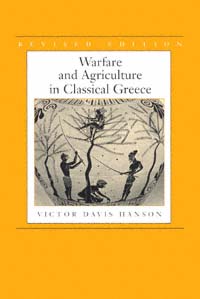 | Title: Warfare and agriculture in classical Greece Author: Hanson, Victor Davis Published: University of California Press, 1998 Subjects: Classics | Classical History | Military History | Ancient History | Classical Politics | Agriculture Publisher's Description: The ancient Greeks were for the most part a rural, not an urban, society. And for much of the Classical period, war was more common than peace. Almost all accounts of ancient history assume that farming and fighting were critical events in the lives of the citizenry. Yet never before have we had a comprehensive modern study of the relationship between agriculture and warfare in the Greek world. In this completely revised edition of Warfare and Agriculture in Classical Greece , Victor Davis Hanson provides a systematic review of Greek agriculture and warfare and describes the relationship between these two important aspects of life in ancient communities. With careful attention to agronomic as well as military details, this well-written, thoroughly researched study reveals the remarkable resilience of those farmland communities.In the past, scholars have assumed that the agricultural infrastructure of ancient society was often ruined by attack, as, for example, Athens was relegated to poverty in the aftermath of the Persian and later Peloponnesian invasions. Hanson's study shows, however, that in reality attacks on agriculture rarely resulted in famines or permanent agrarian depression. Trees and vines are hard to destroy, and grainfields are only briefly vulnerable to torching. In addition, ancient armies were rather inefficient systematic ravagers and instead used other tactics, such as occupying their enemies' farms to incite infantry battle. Warfare and Agriculture in Classical Greece suggests that for all ancient societies, rural depression and desolation came about from more subtle phenomena - taxes, changes in political and social structure, and new cultural values - rather than from destructive warfare. [brief] Similar Items |
| 2. |  | Title: Thinking from things: essays in the philosophy of archaeology Author: Wylie, Alison Published: University of California Press, 2002 Subjects: Philosophy | Archaeology | History of Science Publisher's Description: In this long-awaited compendium of new and newly revised essays, Alison Wylie explores how archaeologists know what they know. Examining the history and methodology of Anglo-American archaeology, Wylie puts the tumultuous debates of the last thirty years in historical and philosophical perspective. Similar Items |
| 3. | 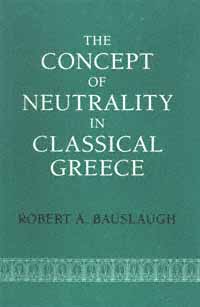 | Title: The concept of neutrality in classical Greece Author: Bauslaugh, Robert A Published: University of California Press, 1991 Subjects: Classics | Law | Classical History Publisher's Description: Looking at Classical warfare from the perspective of the non-belligerents, Robert A. Bauslaugh brings together the scattered evidence testifying to neutral behavior among the Greek city-states and their non-Greek neighbors. Were the Argives of 480/479 B.C. really "Medizers," as many have accused, or were they pursuing a justifiable policy of neutrality as they claimed? On what basis in international law or custom did the Corcyraeans claim non-alignment? Why were the leading belligerent states willing to accept the inclusion of a "neutrality clause" in the Common Peace of 371? These questions have not been asked by historians of international law, and the answers provide a far more complex and sophisticated picture of interstate relations than has so far been available.Despite the absence of exclusively diplomatic language, the concept of respect for neutrals appears early in Greek history and remains a nearly constant feature of Classical wars. The problems confronting uncommitted states, which have clear parallels in modern history, were balanced by widespread acceptance of the need for limitations on the chaos of warfare. [brief] Similar Items |
| 4. | 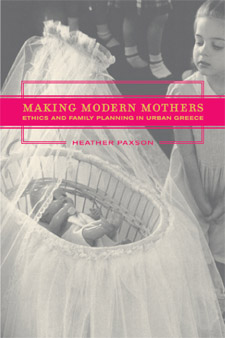 | Title: Making modern mothers: ethics and family planning in urban Greece Author: Paxson, Heather 1968- Published: University of California Press, 2004 Subjects: Gender Studies | Sociology | Anthropology | Anthropology Publisher's Description: In Greece, women speak of mothering as "within the nature" of a woman. But this durable association of motherhood with femininity exists in tension with the highest incidence of abortion and one of the lowest fertility rates in Europe. In this setting, how do women think of themselves as proper individuals, mothers, and Greek citizens? In this anthropological study of reproductive politics and ethics in Athens, Greece, Heather Paxson tracks the effects of increasing consumerism and imported biomedical family planning methods, showing how women's "nature" is being transformed to meet crosscutting claims of the contemporary world. Locating profound ambivalence in people's ethical evaluations of gender and fertility control, Paxson offers a far-reaching analysis of conflicting assumptions about what it takes to be a good mother and a good woman in modern Greece, where assertions of cultural tradition unfold against a backdrop of European Union integration, economic struggle, and national demographic anxiety over a falling birth rate. [brief] Similar Items |
| 5. | 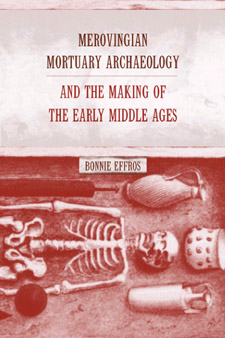 | Title: Merovingian mortuary archaeology and the making of the early Middle Ages Author: Effros, Bonnie 1965- Published: University of California Press, 2003 Subjects: Classics | European Studies | Archaeology | Ancient History | Medieval History | Archaeology Publisher's Description: Clothing, jewelry, animal remains, ceramics, coins, and weaponry are among the artifacts that have been discovered in graves in Gaul dating from the fifth to eighth century. Those who have unearthed them, from the middle ages to the present, have speculated widely on their meaning. This authoritative book makes a major contribution to the study of death and burial in late antique and early medieval society with its long overdue systematic discussion of this mortuary evidence. Tracing the history of Merovingian archaeology within its cultural and intellectual context for the first time, Effros exposes biases and prejudices that have colored previous interpretations of these burial sites and assesses what contemporary archaeology can tell us about the Frankish kingdoms. Working at the intersection of history and archaeology, and drawing from anthropology and art history, Effros emphasizes in particular the effects of historical events and intellectual movements on French and German antiquarian and archaeological studies of these grave goods. Her discussion traces the evolution of concepts of nationhood, race, and culture and shows how these concepts helped shape an understanding of the past. Effros then turns to contemporary multidisciplinary methodologies and finds that we are still limited by the types of information that can be readily gleaned from physical and written sources of Merovingian graves. For example, since material evidence found in the graves of elite families and particularly elite men is more plentiful and noteworthy, mortuary goods do not speak as directly to the conditions in which women and the poor lived. The clarity and sophistication with which Effros discusses the methods and results of European archaeology is a compelling demonstration of the impact of nationalist ideologies on a single discipline and of the struggle toward the more pluralistic vision that has developed in the post-war years. [brief] Similar Items |
| 6. | 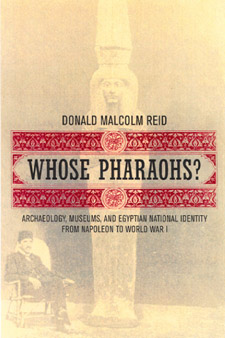 | Title: Whose pharaohs?: archaeology, museums, and Egyptian national identity from Napoleon to World War I Author: Reid, Donald M. (Donald Malcolm) 1940- Published: University of California Press, 2002 Subjects: History | Middle Eastern History | European History | Middle Eastern Studies | Classics | Art History Publisher's Description: Egypt's rich and celebrated ancient past has served many causes throughout history--in both Egypt and the West. Concentrating on the era from Napoleon's conquest and the discovery of the Rosetta Stone to the outbreak of World War I, this book examines the evolution of Egyptian archaeology in the context of Western imperialism and nascent Egyptian nationalism. Traditionally, histories of Egyptian archaeology have celebrated Western discoverers such as Champollion, Mariette, Maspero, and Petrie, while slighting Rifaa al-Tahtawi, Ahmad Kamal, and other Egyptians. This exceptionally well-illustrated and well-researched book writes Egyptians into the history of archaeology and museums in their own country and shows how changing perceptions of the past helped shape ideas of modern national identity. Drawing from rich archival sources in Egypt, the United Kingdom, and France, and from little-known Arabic publications, Reid discusses previously neglected topics in both scholarly Egyptology and the popular "Egyptomania" displayed in world's fairs and Orientalist painting and photography. He also examines the link between archaeology and the rise of the modern tourist industry. This richly detailed narrative discusses not only Western and Egyptian perceptions of pharaonic history and archaeology but also perceptions of Egypt's Greco-Roman, Coptic, and Islamic eras. Throughout this book, Reid demonstrates how the emergence of archaeology affected the interests and self-perceptions of modern Egyptians. In addition to uncovering a wealth of significant new material on the history of archaeology and museums in Egypt, Reid provides a fascinating window on questions of cultural heritage--how it is perceived, constructed, claimed, and contested. [brief] Similar Items |
| 7. | 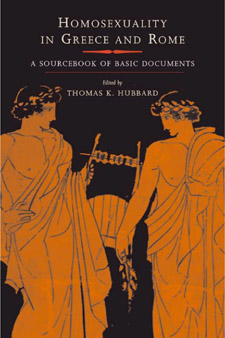 | Title: Homosexuality in Greece and Rome: a sourcebook of basic documents Author: Hubbard, Thomas K Published: University of California Press, 2003 Subjects: Gender Studies | Classics | GayLesbian and Bisexual Studies Publisher's Description: The most important primary texts on homosexuality in ancient Greece and Rome are translated into modern, explicit English and collected together for the first time in this comprehensive sourcebook. Covering an extensive period - from the earliest Greek texts in the late seventh century b.c.e. to Greco-Roman texts of the third and fourth centuries c.e. - the volume includes well-known writings by Plato, Sappho, Aeschines, Catullus, and Juvenal, as well as less well known but highly relevant and intriguing texts such as graffiti, comic fragments, magical papyri, medical treatises, and selected artistic evidence. These fluently translated texts, together with Thomas K. Hubbard's valuable introductions, clearly show that there was in fact no more consensus about homosexuality in ancient Greece and Rome than there is today. The material is organized by period and by genre, allowing readers to consider chronological developments in both Greece and Rome. Individual texts each are presented with a short introduction contextualizing them by date and, where necessary, discussing their place within a larger work. Chapter introductions discuss questions of genre and the ideological significance of the texts, while Hubbard's general introduction to the volume addresses issues such as sexual orientation in antiquity, moral judgments, class and ideology, and lesbianism. With its broad, unexpurgated, and thoroughly informed presentation, this unique anthology gives an essential perspective on homosexuality in classical antiquity. [brief] Similar Items |
| 8. | 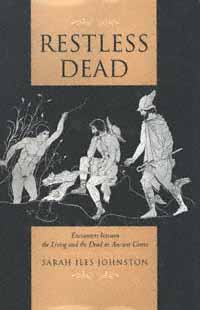 | Title: Restless dead: encounters between the living and the dead in ancient Greece Author: Johnston, Sarah Iles 1957- Published: University of California Press, 1999 Subjects: Classics | Classical Religions | Classical Literature and Language | Intellectual History | Folklore and Mythology | Cultural Anthropology Publisher's Description: During the archaic and classical periods, Greek ideas about the dead evolved in response to changing social and cultural conditions - most notably changes associated with the development of the polis, such as funerary legislation, and changes due to increased contacts with cultures of the ancient Near East. In Restless Dead , Sarah Iles Johnston presents and interprets these changes, using them to build a complex picture of the way in which the society of the dead reflected that of the living, expressing and defusing its tensions, reiterating its values and eventually becoming a source of significant power for those who knew how to control it. She draws on both well-known sources, such as Athenian tragedies, and newer texts, such as the Derveni Papyrus and a recently published lex sacra from Selinous.Topics of focus include the origin of the goes (the ritual practitioner who made interaction with the dead his specialty), the threat to the living presented by the ghosts of those who died dishonorably or prematurely, the development of Hecate into a mistress of ghosts and its connection to female rites of transition, and the complex nature of the Erinyes. Restless Dead culminates with a new reading of Aeschylus' Oresteia that emphasizes how Athenian myth and cult manipulated ideas about the dead to serve political and social ends. [brief] Similar Items |
| 9. | 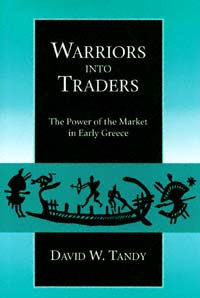 | Title: Warriors into traders: the power of the market in early Greece Author: Tandy, David W Published: University of California Press, 1997 Subjects: Classics | Ancient History | Classical History | Economics and Business | Anthropology | Politics Publisher's Description: The eighth century dawned on a Greek world that had remained substantially unchanged during the centuries of stagnation known as the Dark Age. This book is a study of the economic and cultural upheaval that shook mainland Greece and the Aegean area in the eighth century, and the role that poetry played in this upheaval. Using tools from political and economic anthropology, David Tandy argues that between about 800 and 700 B.C., a great transformation of dominant economic institutions took place involving wrenching adjustments in the way status and wealth were distributed within the Greek communities.Tandy explores the economic organization of preindustrial societies, both ancient and contemporary, to shed light on the Greek experience. He argues that the sudden shift in Greek economic formations led to new social behaviors and to new social structures such as the polis , itself a by-product of economic change. Unraveling the dialectic between the material record and epic poetry, Tandy shows that the epic tradition mirrored these new social behaviors and that it portrayed the stresses that economic change brought to the ancient Aegean world.Tandy brings in comparative evidence from other small-scale communities beset by changes, spotlighting the specific plight of one community, Ascra in Boeotia, on whose behalf Hesiod sang his Works and Days . The result is a lively, moving account of a human dilemma that, many centuries later, is all too familiar. [brief] Similar Items |
| 10. | 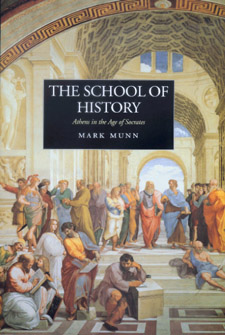 | Title: The school of history: Athens in the age of Socrates Author: Munn, Mark Henderson Published: University of California Press, 2000 Subjects: Classics | Classical History | Ancient History | Classical Politics Publisher's Description: History, political philosophy, and constitutional law were born in Athens in the space of a single generation--the generation that lived through the Peloponnesian War (431-404 b.c.e.). This remarkable age produced such luminaries as Socrates, Herodotus, Thucydides, Sophocles, Euripides, Aristophanes, and the sophists, and set the stage for the education and early careers of Plato and Xenophon, among others. The School of History provides the fullest and most detailed intellectual and political history available of Athens during the late fifth century b.c.e., as it examines the background, the context, and the decisive events shaping this society in the throes of war. This expansive, readable narrative ultimately leads to a new understanding of Athenian democratic culture, showing why and how it yielded such extraordinary intellectual productivity. As both a source and a subject, Thucydides' history of the Peloponnesian War is the central text around which the narrative and thematic issues of the book revolve. Munn re-evaluates the formation of the Greek historiographical tradition itself as he identifies the conditions that prompted Thucydides to write--specifically the historian's desire to guide the Athenian democracy as it struggled to comprehend its future. The School of History fully encompasses recent scholarship in history, literature, and archaeology. Munn's impressive mastery of the huge number of sources and publications informs his substantial contributions to our understanding of this democracy transformed by war. Immersing us fully in the intellectual foment of Athenian society, The School of History traces the history of Athens at the peak of its influence, both as a political and military power in its own time and as a source of intellectual inspiration for the centuries to come. [brief] Similar Items |
| 11. | 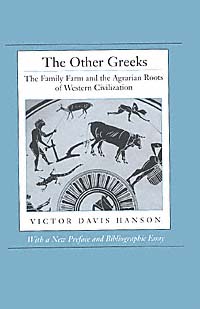 | Title: The other Greeks: the family farm and the agrarian roots of western civilization Author: Hanson, Victor Davis Published: University of California Press, 1999 Subjects: Classics | European History Publisher's Description: For generations, scholars have focused on the rise of the Greek city-state and its brilliant cosmopolitan culture as the ultimate source of the Western tradition in literature, philosophy, and politics. This passionate book leads us outside the city walls to the countryside, where the vast majority of the Greek citizenry lived, to find the true source of the cultural wealth of Greek civilization. Victor Hanson shows that the real "Greek revolution" was not merely the rise of a free and democratic urban culture, but rather the historic innovation of the independent family farm.The farmers, vinegrowers, and herdsmen of ancient Greece are "the other Greeks," who formed the backbone of Hellenic civilization. It was these tough-minded, practical, and fiercely independent agrarians, Hanson contends, who gave Greek culture its distinctive emphasis on private property, constitutional government, contractual agreements, infantry warfare, and individual rights. Hanson's reconstruction of ancient Greek farm life, informed by hands-on knowledge of the subject (he is a fifth-generation California vine- and fruit-grower) is fresh, comprehensive, and absorbing. His detailed chronicle of the rise and tragic fall of the Greek city-state also helps us to grasp the implications of what may be the single most significant trend in American life today - the imminent extinction of the family farm. [brief] Similar Items |
| 12. | 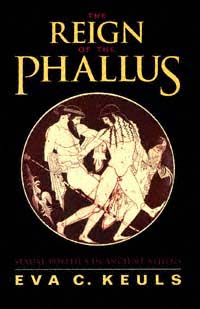 | Title: The reign of the phallus: sexual politics in ancient Athens Author: Keuls, Eva C Published: University of California Press, 1993 Subjects: Classics | History | Art and Architecture | Ancient History Publisher's Description: At once daring and authoritative, this book offers a profusely illustrated history of sexual politics in ancient Athens.The phallus was pictured everywhere in ancient Athens: painted on vases, sculpted in marble, held aloft in gigantic form in public processions, and shown in stage comedies. This obsession with the phallus dominated almost every aspect of public life, influencing law, myth, and customs, affecting family life, the status of women, even foreign policy.This is the first book to draw together all the elements that made up the "reign of the phallus" - men's blatant claim to general dominance, the myths of rape and conquest of women, and the reduction of sex to a game of dominance and submission, both of women by men and of men by men.In her elegant and lucid text Eva Keuls not only examines the ideology and practices that underlay the reign of the phallus, but also uncovers an intense counter-movement - the earliest expressions of feminism and antimilitarism.Complementing the text are 345 reproductions of Athenian vase paintings. Some have been reproduced in a larger format and gathered in an appendix for easy reference and closer study. These revealing illustrations are a vivid demonstration that classical Athens was more sexually polarized and repressive of women than any other culture in Western history. [brief] Similar Items |
| 13. | 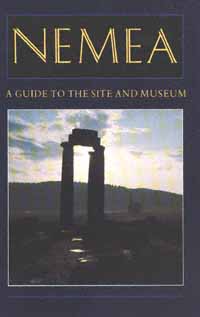 | Title: Nemea: a guide to the site and museum Author: Miller, Stephen G. (Stephen Gaylord) 1942- Published: University of California Press, 1989 Subjects: Classics | History | Archaeology | Ancient History Publisher's Description: In classical antiquity, beginning in 573 B.C., Nemea hosted international athletic competitions like those at Olympia, Delphi, and Isthmia; the games at the four sites constituted the Panhellenic cycle, and the victors were the most famous athletes of antiquity. Nemea was never a city-state but served as a religious and athletic festival center where the Greek world assembled every two years under a flag of truce.Since 1974, excavations sponsored by the University of California at Berkeley have revealed many details of Nemea's history, as well as evidence for the nature of the buildings and other facilities which were part of the festival center. These discoveries, together with smaller finds in the museum and ancient literary and epigraphic sources, form the basis of a new and sharply defined picture of the Nemean Games.This guidebook is an introduction to the history and physical remains of the festival center and a complement to detailed final publications on the excavation now being prepared. [brief] Similar Items |
| 14. | 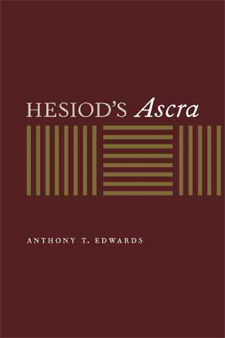 | Title: Hesiod's Ascra Author: Edwards, Anthony T Published: University of California Press, 2004 Subjects: Classics | Classical History | Classical Politics | Classical Literature and Language | Economics and Business Publisher's Description: In Works and Days, one of the two long poems that have come down to us from Hesiod, the poet writes of farming, morality, and what seems to be a very nasty quarrel with his brother Perses over their inheritance. In this book, Anthony T. Edwards extracts from the poem a picture of the social structure of Ascra, the hamlet in northern Greece where Hesiod lived, most likely during the seventh century b.c.e. Drawing on the evidence of trade, food storage, reciprocity, and the agricultural regime as Hesiod describes them in Works and Days, Edwards reveals Ascra as an autonomous village, outside the control of a polis, less stratified and integrated internally than what we observe even in Homer. In light of this reading, theconflict between Hesiod and Perses emerges as a dispute about the inviolability of the community's external boundary and the degree of interobligation among those within the village. Hesiod's Ascra directly counters the accepted view of Works and Days, which has Hesiod describing a peasant society subordinated to the economic and political control of an outside elite. Through his deft analysis, Edwards suggests a new understanding of both Works and Days and the social and economic organization of Hesiod's time and place. [brief] Similar Items |
| 15. | 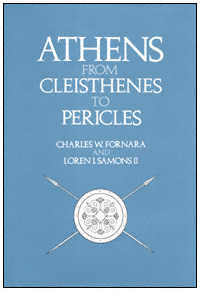 | Title: Athens from Cleisthenes to Pericles Author: Fornara, Charles W Published: University of California Press, 1991 Subjects: Classics | Classical History | Classical Politics Publisher's Description: By the mid fifth century B.C., Athens had become the most powerful city-state in Greece: a rich democracy led by Pericles that boldly gained control of an empire. Athens's strength under Pericles was the result of a complex interaction of events from the time of Cleisthenes. Fornara and Samons unravel the intricacies of the conflicting ancient sources to show how the development of both democracy and empire were interdependent in Athens's multifaceted evolution. The authors trace and contrast four stands of development: the history of the Alcmeonid family of Cleisthenes and Pericles, the nature and development of Athenian democracy, the growth of Athenian empire, and the burgeoning antagonism between Athens and Sparta. The fresh perspective thus afforded by this clear presentation will intrigue those with interests in both ancient economics and politics.The figure of Pericles is central to all four avenues of inquiry. His decision to create the enmisthos polis marked a fateful turn. Henceforth the democracy and the empire presupposed each other. Ultimately, Pericles's policies fueled Sparta's growing insecurity, resulting in her declaration of war on Athens in 431 B.C. and Athens's eventual fall. [brief] Similar Items |
| 16. | 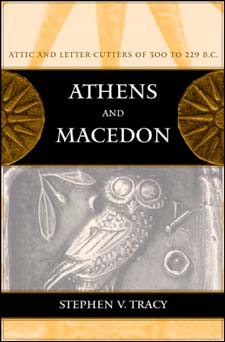 | Title: Athens and Macedon: Attic letter-cutters of 300 to 229 B.C Author: Tracy, Stephen V 1941- Published: University of California Press, 2003 Subjects: Classics | Classical History | Archaeology | Ancient History Publisher's Description: Little of the historiography of third-century Athens survives, and much of what we know - or might know - about the period has come down to us in inscriptions carved by Attic stonemasons of the time. In this book Stephen Tracy, the world's preeminent expert in this area, provides new insight into an . . . [more] Similar Items |
| 17. | 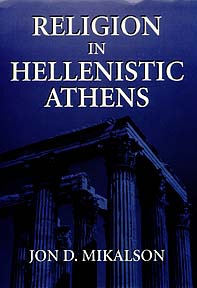 | Title: Religion in Hellenistic Athens Author: Mikalson, Jon D 1943- Published: University of California Press, 1998 Subjects: Classics | Classical Religions | Religion | Ancient History Publisher's Description: Until now, there has been no comprehensive study of religion in Athens from the end of the classical period to the time of Rome's domination of the city. Jon D. Mikalson provides a chronological approach to religion in Hellenistic Athens, disproving the widely held belief that Hellenistic religion during this period represented a decline from the classical era. Drawing from epigraphical, historical, literary, and archaeological sources, Mikalson traces the religious cults and beliefs of Athenians from the battle of Chaeroneia in 338 B.C. to the devastation of Athens by Sulla in 86 B.C., demonstrating that traditional religion played a central and vital role in Athenian private, social, and political life. Mikalson describes the private and public religious practices of Athenians during this period, emphasizing the role these practices played in the life of the citizens and providing a careful scruntiny of individual cults. He concludes his study by using his findings from Athens to call into question several commonly held assumptions about the general development of religion in Hellenistic Greece. [brief] Similar Items |
| 18. | 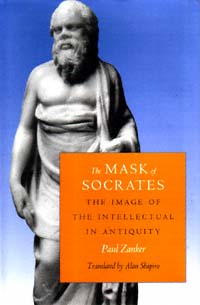 | Title: The mask of Socrates: the image of the intellectual in antiquity Author: Zanker, Paul Published: University of California Press, 1996 Subjects: Classics | Art History | Art and Architecture | Ancient History Publisher's Description: This richly illustrated work provides a new and deeper perspective on the interaction of visual representation and classical culture from the fifth century B.C. to the fourth century A.D. Drawing on a variety of source materials such as Graeco-Roman literature, historiography, and philosophy, in addition to artistic renderings, Paul Zanker forges the first comprehensive history of the visual representation of Greek and Roman intellectuals. He takes the reader from the earliest visual images of Socrates and Plato to the figures of Christ, the Apostles, and contemporaneous pagan and civic dignitaries.Through his interpretations of postures, gestures, facial expressions, and stylistic changes of particular set pieces, we come to know these great poets and philosophers through all of their various personas - the prophetic wise man, the virtuous democratic citizen, or the self-absorbed bon vivant. Zanker's analysis of how the iconography of influential thinkers and writers changed demonstrates the rise and fall of trends and the movement of schools of thought and belief, each successively embodying the most valued characteristics of the period and culture. [brief] Similar Items |
| 19. | 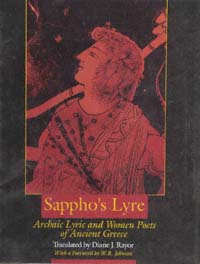 | Title: Sappho's lyre: archaic lyric and women poets of ancient Greece Author: Rayor, Diane J Published: University of California Press, 1991 Subjects: Classics | Classical Literature and Language | Literature in Translation | Poetry Publisher's Description: Sappho sang her poetry to the accompaniment of the lyre on the Greek island of Lesbos over 2500 years ago. Throughout the Greek world, her contemporaries composed lyric poetry full of passion, and in the centuries that followed the golden age of archaic lyric, new forms of poetry emerged. In this unique anthology, today's reader can enjoy the works of seventeen poets, including a selection of archaic lyric and the complete surviving works of the ancient Greek women poets - the latter appearing together in one volume for the first time. Sappho's Lyre is a combination of diligent research and poetic artistry. The translations are based on the most recent discoveries of papyri (including "new" Archilochos and Stesichoros) and the latest editions and scholarship. The introduction and notes provide historical and literary contexts that make this ancient poetry more accessible to modern readers.Although this book is primarily aimed at the reader who does not know Greek, it would be a splendid supplement to a Greek language course. It will also have wide appeal for readers of' ancient literature, women's studies, mythology, and lovers of poetry. [brief] Similar Items |
| 20. | 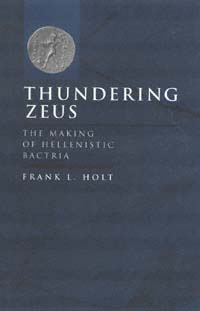 | Title: Thundering Zeus: the making of Hellenistic Bactria Author: Holt, Frank Lee Published: University of California Press, 1999 Subjects: Classics | Classical History | Archaeology | Ancient History | History Publisher's Description: Thundering Zeus uses an innovative, interdisciplinary approach to resolve one of the greatest puzzles in all of Hellenistic history. This book explores the remarkable rise of a Greek-ruled kingdom in ancient Bactria (modern Afghanistan) during the third century B.C. Diodotus I and II, whose dynasty emblazoned its coins with the dynamic image of Thundering Zeus, led this historic movement by breaking free of the Seleucid Empire and building a strong independent state in Central Asia. The chronology and crises that defined their reigns have been established here for the first time, and Frank Holt sets this new history into the larger context of Hellenistic studies.The best sources for understanding Hellenistic Bactria are archaeological, and they include a magnificent trove of coins. In addition to giving a history of Bactria, Thundering Zeus provides a catalog of these coins, as well as an introduction to the study of numismatics itself. Holt presents this fascinating material with the precision and acuity of a specialist and with the delight of an admirer, providing an up-to-date full catalog of known Diodotid coinage, and illustrating twenty-three coins.This succinct, energetic narrative thunders across the history of Hellenistic Bactria, exhuming coins, kingdoms, and customs as it goes. The result is a book that is both a history and a history of discovery, with much to offer those interested in ancient texts, archaeology, and coins. [brief] Similar Items |